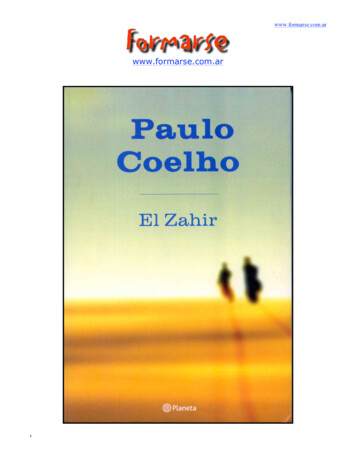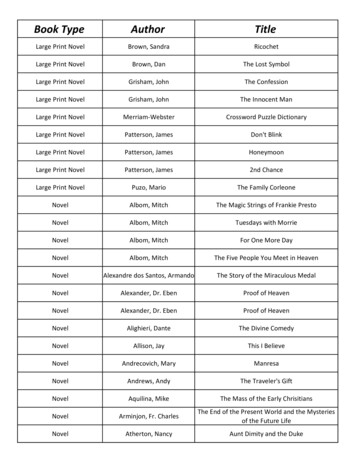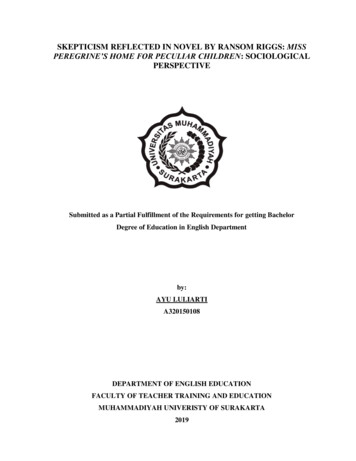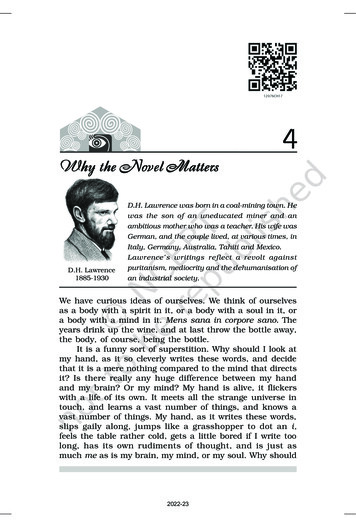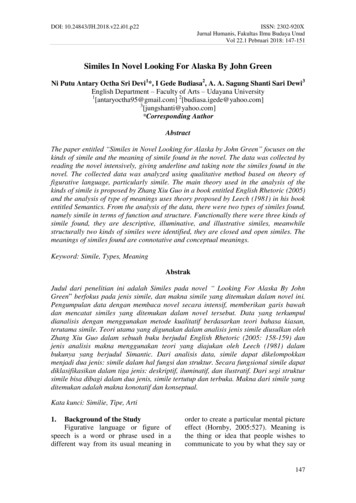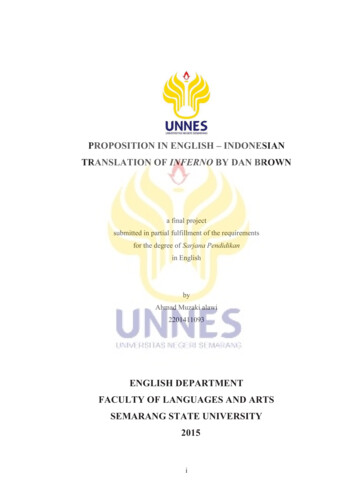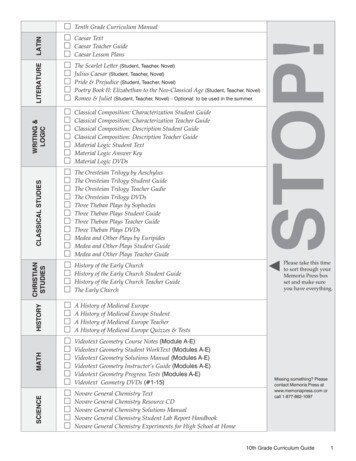
Transcription
The Zahir
The ZahirThe Zahir Coelho, Paulo
The ZahirI AM A FREE MANHer name is Esther; she is a warcorrespondent who has just returned from Iraqbecause of the imminent invasion of that country;she is thirty years old, married, without children.He is an unidentified male, between twenty-threeand twenty-five years old, with dark, Mongolianfeatures. The two were last seen in a café on theRue du Faubourg St-Honoré.The police were told that they had metbefore, although no one knew how often: Estherhad always said that the man—who concealed histrue identity behind the name Mikhail—wassomeone very important, although she had neverexplained whether he was important for her careeras a journalist or for her as a woman.The police began a formal investigation.Various theories were put forward—kidnapping,blackmail, a kidnapping that had ended in murder—none of which were beyond the bounds ofpossibility given that, in her search for information,her work brought her into frequent contact withpeople who had links with terrorist cells. They
discovered that, in the weeks prior to herdisappearance, regular sums of money had beenwithdrawn from her bank account: those in chargeof the investigation felt that these could have beenpayments made for information. She had taken nochange of clothes with her, but, oddly enough, herpassport was nowhere to be found.He is a stranger, very young, with no policerecord, with no clue as to his identity.She is Esther, thirty years old, the winner oftwo international prizes for journalism, andmarried.My wife.I immediately come under suspicion and amdetained because I refuse to say where I was onthe day she disappeared. However, a prisonofficer has just opened the door of my cell, sayingthat I’m a free man.And why am I a free man? Becausenowadays, everyone knows everything abouteveryone; you just have to ask and the informationis there: where you’ve used your credit card,where you spend your time, whom you’ve sleptwith. In my case, it was even easier: a woman,another journalist, a friend of my wife, anddivorced—which is why she doesn’t mindrevealing that she slept with me—came forwardas a witness in my favor when she heard that I had
been detained. She provided concrete proof that Iwas with her on the day and the night of Esther’sdisappearance.I talk to the chief inspector, who returns mybelongings and offers his apologies, adding thatmy rapid detention was entirely within the law, andthat I have no grounds on which to accuse or suethe state. I say that I haven’t the slightest intentionof doing either of those things, that I am perfectlyaware that we are all under constant suspicionand under twenty-four-hour surveillance, evenwhen we have committed no crime.“You’re free to go,” he says, echoing thewords of the prison officer.I ask: Isn’t it possible that something reallyhas happened to my wife? She had said to meonce that—understandably given her vast networkof contacts in the terrorist underworld—sheoccasionally got the feeling she was beingfollowed.The inspector changes the subject. I insist,but he says nothing.I ask if she would be able to travel on herpassport, and he says, of course, since she hascommitted no crime. Why shouldn’t she leave andenter the country freely?“So she may no longer be in France?”“Do you think she left you because of thatwoman you’ve been sleeping with?”
That’s none of your business, I reply. Theinspector pauses for a second and grows serious;he says that I was arrested as part of routineprocedure, but that he is nevertheless very sorryabout my wife’s disappearance. He is marriedhimself and although he doesn’t like my books(So he isn’t as ignorant as he looks! He knowswho I am!), he can put himself in my shoes andimagine what I must be going through.I ask him what I should do next. He gives mehis card and asks me to get in touch if I hearanything. I’ve watched this scene in dozens offilms, and I’m not convinced; inspectors alwaysknow more than they say they do.He asks me if I have ever met the person whowas with Esther the last time she was seen alive. Isay that I knew his code name, but didn’t knowhim personally.He asks if we have any domestic problems. Isay that we’ve been together for ten years andhave the same problems most married coupleshave—nothing more.He asks, delicately, if we have discusseddivorce recently, or if my wife was consideringleaving me. I tell him we have never evenconsidered the possibility, and say again that “likeall couples” we have our occasionaldisagreements.Frequent or only occasional?
Occasional, I say.He asks still more delicately if she suspectedthat I was having an affair with her friend. I tell himthat it was the first—and last—time that her friendand I had slept together. It wasn’t an affair; it cameabout simply because we had nothing else to do.It had been a bit of a dull day, neither of us hadany pressing engagements after lunch, and thegame of seduction always adds a little zest to life,which is why we ended up in bed together.“You go to bed with someone just becauseit’s a bit of a dull day?”I consider telling him that such matters hardlyform part of his investigations, but I need his help,or might need it later on. There is, after all, thatinvisible institution called the Favor Bank, which Ihave always found so very useful.“Sometimes, yes. There’s nothing else veryinteresting to do, the woman is looking forexcitement, I’m looking for adventure, and that’sthat. The next day, you both pretend that nothinghappened, and life goes on.”He thanks me, holds out his hand and saysthat in his world, things aren’t quite like that.Naturally, boredom and tedium exist, as does thedesire to go to bed with someone, but everythingis much more controlled, and no one ever acts ontheir thoughts or desires.“Perhaps artists have more freedom,” he
remarks.I say that I’m familiar with his world, but haveno wish to enter into a comparison between ourdifferent views of society and people. I remainsilent, awaiting his next move.“Speaking of freedom,” he says, slightlydisappointed at this writer’s refusal to enter into adebate with a police officer, “you’re free to go.Now that I’ve met you, I’ll read your books. I know Isaid I didn’t like them, but the fact is I’ve neveractually read one.”This is not the first or the last time that I willhear these words. At least this whole episode hasgained me another reader. I shake his hand andleave.I’m free. I’m out of prison, my wife hasdisappeared under mysterious circumstances, Ihave no fixed timetable for work, I have noproblem meeting new people, I’m rich, famous,and if Esther really has left me, I’ll soon findsomeone to replace her. I’m free, independent.But what is freedom?I’ve spent a large part of my life enslaved toone thing or another, so I should know themeaning of the word. Ever since I was a child, Ihave fought to make freedom my most preciouscommodity. I fought with my parents, who wantedme to be an engineer, not a writer. I fought with the
other boys at school, who immediately homed inon me as the butt of their cruel jokes, and onlyafter much blood had flowed from my nose andfrom theirs, only after many afternoons when I hadto hide my scars from my mother—because it wasup to me, not her, to solve my problems—did Imanage to show them that I could take a thrashingwithout bursting into tears. I fought to get a job tosupport myself, and went to work as a deliveryman for a hardware store, so as to be free fromthat old line in family blackmail: “We’ll give youmoney, but you’ll have to do this, this, and this.”I fought—although without success—for thegirl I was in love with when I was an adolescent,and who loved me too; she left me in the endbecause her parents convinced her that I had nofuture.I fought against the hostile world of journalism—my next job—where my first boss kept mehanging around for three whole hours and onlydeigned to take any notice of me when I startedtearing up the book he was reading: he looked atme in surprise and saw that here was someonecapable of persevering and confronting theenemy, essential qualities for a good reporter. Ifought for the socialist ideal, went to prison, cameout and went on fighting, feeling like a workingclass hero—until, that is, I heard the Beatles anddecided that rock music was much more fun than
Marx. I fought for the love of my first, second, andthird wives. I fought to find the courage to leave myfirst, second, and third wives, because the love Ifelt for them hadn’t lasted, and I needed to moveon, until I found the person who had been put inthis world to find me—and she was none of thosethree.I fought for the courage to leave my job on thenewspaper and launch myself into the adventureof writing a book, knowing full well that no one inmy country could make a living as a writer. I gaveup after a year, after writing more than a thousandpages—pages of such genius that even I couldn’tunderstand them.While I was fighting, I heard other peoplespeaking in the name of freedom, and the morethey defended this unique right, the moreenslaved they seemed to be to their parents’wishes, to a marriage in which they had promisedto stay with the other person “for the rest of theirlives,” to the bathroom scales, to their diet, to halffinished projects, to lovers to whom they wereincapable of saying “No” or “It’s over,” toweekends when they were obliged to have lunchwith people they didn’t even like. Slaves to luxury,to the appearance of luxury, to the appearance ofthe appearance of luxury. Slaves to a life they hadnot chosen, but which they had decided to livebecause someone had managed to convince
them that it was all for the best. And so theiridentical days and nights passed, days and nightsin which adventure was just a word in a book or animage on the television that was always on, andwhenever a door opened, they would say:“I’m not interested. I’m not in the mood.”How could they possibly know if they were inthe mood or not if they had never tried? But therewas no point in asking; the truth was they wereafraid of any change that would upset the worldthey had grown used to.The inspector says I’m free. I’m free now andI was free in prison too, because freedomcontinues to be the thing I prize most in the world.Of course, this has led me to drink wines I did notlike, to do things I should not have done and whichI will not do again; it has left scars on my body andon my soul, it has meant hurting certain people,although I have since asked their forgiveness,when I realized that I could do absolutely anythingexcept force another person to follow me in mymadness, in my lust for life. I don’t regret thepainful times; I bear my scars as if they weremedals. I know that freedom has a high price, ashigh as that of slavery; the only difference is thatyou pay with pleasure and a smile, even when thatsmile is dimmed by tears.I leave the police station, and it’s a beautiful
day outside, a sunny Sunday that does not reflectmy state of mind at all. My lawyer is waiting for mewith a few consoling words and a bunch offlowers. He says that he’s phoned around to all thehospitals and morgues (the kind of thing you dowhen someone fails to return home), but has notas yet found Esther. He says that he managed toprevent journalists from finding out where I wasbeing held. He says he needs to talk to me inorder to draw up a legal strategy that will help medefend myself against any future accusation. Ithank him for all his trouble; I know he’s not reallyinterested in drawing up a legal strategy, he justdoesn’t want to leave me alone, because he’s notsure how I’ll react. (Will I get drunk and bearrested again? Will I cause a scandal? Will I tryto kill myself?) I tell him I have some importantbusiness to sort out and that we both knowperfectly well that I have no problem with the law.He insists, but I give him no choice—after all, I’m afree man.Freedom. The freedom to be wretchedlyalone.I take a taxi to the center of Paris and ask tobe dropped near the Arc de Triomphe. I set offdown the Champs-Elysées toward the HôtelBristol, where Esther and I always used to meetfor hot chocolate whenever one of us came backfrom some trip abroad. It was our coming-home
ritual, a plunge back into the love that bound ustogether, even though life kept sending us offalong ever more diverging paths.I keep walking. People smile, children arepleased to have been given these few hours ofspring in the middle of winter, the traffic flowsfreely, everything seems to be in order—exceptthat none of them know that I have just lost mywife; they don’t even pretend not to know, theydon’t even care. Don’t they realize the pain I’m in?They should all be feeling sad, sympathetic,supportive of a man whose soul is losing love as ifit were losing blood; but they continue laughing,immersed in their miserable little lives that onlyhappen on weekends.What a ridiculous thought! Many of thepeople I pass must also have their souls in tatters,and I have no idea how or why they are suffering.I go into a bar and buy some cigarettes; theperson answers me in English. I go into achemist’s to buy a mint I particularly like, and theassistant speaks to me in English (both times Iasked for the products in French). Before I reachthe hotel, I am stopped by two boys just arrivedfrom Toulouse who are looking for a particularshop; they have asked several other people, butno one understands what they say. What’s goingon? Have they changed languages on theChamps-Elysées in the twenty-four hours since I
was arrested?Tourism and money can perform miracles,but how come I haven’t noticed this before? It hasobviously been a long time since Esther and I methere to drink hot chocolate, even though we haveeach been away and come back several timesduring that period. There is always somethingmore important. There is always someunpostponable appointment. Yes, my love, we’llhave that hot chocolate next time, come backsoon; I’ve got a really important interview todayand won’t be able to pick you up at the airport,take a taxi; my cell phone’s on, call me if there’sanything urgent; otherwise, I’ll see you tonight.My cell phone! I take it out of my pocket andimmediately turn it on; it rings several times, andeach time my heart turns over. On the tiny screen Isee the names of the people who have beentrying to get in touch with me, but reply to none ofthem. I hope for someone “unidentified” to appear,because that would be she, since only abouttwenty people know my number and have swornnot to pass it on. It doesn’t appear, only thenumbers of friends or trusted colleagues. Theymust be eager to know what happened, they wantto help (but how?), to ask if I need anything.The telephone keeps ringing. Should Ianswer it? Should I arrange to meet up with someof these people?
I decide to remain alone until I’ve managed towork out what is going on.I reach the Hôtel Bristol, which Esther alwaysdescribed as one of the few hotels in Paris wherecustomers are treated like guests rather thanhomeless people in search of shelter. I amgreeted as if I were a friend of the family; I choosea table next to an exquisite clock; I listen to thepiano and look out at the garden.I need to be practical, to study the options;after all, life goes on. I am not the first nor will I bethe last man whose wife has left him, but did ithave to happen on a sunny day, with everyone inthe street smiling and children singing, with thefirst signs of spring just beginning to show, the sunshining, and drivers stopping at pedestriancrossings?I pick up a napkin. I’m going to get theseideas out of my head and put them down onpaper. Let’s leave sentiment to one side and seewhat I should do:(a) Consider the possibility that she really hasbeen kidnapped and that her life is in danger atthis very moment, and that I, as her husband andconstant companion, must therefore move heavenand earth to find her.Response to this possibility: she took herpassport with her. The police don’t know this, butshe also took several other personal items with
her, among them a wallet containing images ofvarious patron saints which she always carrieswith her whenever she goes abroad. She alsowithdrew money from her bank.Conclusion: she was clearly preparing toleave.(b) Consider the possibility that she believeda promise someone gave her and it turned out tobe a trap.Response: she had often put herself indangerous situations before; it was part of her job,but she always warned me when she did so,because I was the only person she could trustcompletely. She would tell me where she wasgoing to be, who she was going to see (although,so as not to put me at risk, she usually used theperson’s nom de guerre), and what I should do ifshe did not return by a certain time.Conclusion: she was not planning a meetingwith one of her informants.(c) Consider the possibility that she has metanother man.Response: there is no response. Of all thehypotheses, this is the only one that makes anysense. And yet I can’t accept it, I can’t accept thatshe would leave like that, without giving me areason. Both Esther and I have always pridedourselves on confronting all life’s difficultiestogether. We suffered, but we never lied to each
other, although it was part of the rules of the gamenot to mention any extramarital affairs. I wasaware that she had changed a lot since meetingthis fellow Mikhail, but did that justify ending amarriage that has lasted ten years?Even if she had slept with him and fallen inlove, wouldn’t she weigh in the balance all the timethat we had spent together and everything we hadconquered before setting off on an adventure fromwhich there was no turning back? She was free totravel whenever she wanted to, she livedsurrounded by men, soldiers who hadn’t seen awoman in ages, but I never asked any questions,and she never told me anything. We were bothfree, and we were proud of that.But Esther had disappeared and left cluesthat were visible only to me, as if it were a secretmessage: I’m leaving.Why?Is that question worth answering?No. Because hidden in the answer is my owninability to keep the woman I love by my side. Is itworth finding her and persuading her to comeback? Begging and imploring her to give ourmarriage another chance?That seems ridiculous: it would be bettermerely to suffer as I had in the past, when otherpeople I loved had left me. It would be better justto lick my wounds, as I had also done in the past.
For a while, I’ll think obsessively about her, I’llbecome embittered, I’ll bore my friends becauseall I ever talk about is my wife leaving me. I’ll try tojustify what happened, spend days and nightsreviewing every moment spent by her side, I’llconclude that she was too hard on me, eventhough I always tried to do my best. I’ll find otherwomen. When I walk down the street, I’ll keepseeing women who could be her. I’ll suffer day andnight, night and day. This could take weeks,months, possibly a year or more.Until one morning, I’ll wake up and find I’mthinking about something else, and then I’ll knowthe worst is over. My heart might be bruised, but itwill recover and become capable of seeing thebeauty of life once more. It’s happened before, itwill happen again, I’m sure. When someoneleaves, it’s because someone else is about toarrive—I’ll find love again.For a moment, I savor the idea of my newstate: single and a millionaire. I can go out inbroad daylight with whomever I want. I can behaveat parties in a way I haven’t behaved in years. Thenews will travel fast, and soon all kinds of women,the young and the not so young, the rich and thenot as rich as they would like to be, the intelligentand those trained to say only what they think Iwould like to hear, will all come knocking at mydoor.
I want to believe that it is wonderful to be free.Free again. Ready to find my one true love, who iswaiting for me and who will never allow me toexperience such humiliation again.I finish my hot chocolate and look at the clock;I know it is still too soon for me to be able to enjoythe agreeable feeling that I am once more part ofhumanity. For a few moments, I imagine thatEsther is about to come in through that door, walkacross the beautiful Persian carpets, sit downbeside me and say nothing, just smoke acigarette, look out at the courtyard garden andhold my hand. Half an hour passes, and for half anhour I believe in the story I have just created, until Irealize that it is pure fantasy.I decide not to go home. I go over toreception, ask for a room, a toothbrush, and somedeodorant. The hotel is full, but the manager fixesthings for me: I end up with a lovely suite lookingout at the Eiffel Tower, a terrace, the rooftops ofParis, the lights coming on one by one, thefamilies getting together to have Sunday supper.And the feeling I had in the Champs-Elyséesreturns: the more beautiful everything is aroundme, the more wretched I feel.No television. No supper. I sit on the terraceand look back over my life, a young man whodreamed of becoming a famous writer, and who
suddenly saw that the reality was completelydifferent—he writes in a language almost no onereads, in a country which is said to have almost noreading public. His family forces him to go touniversity (any university will do, my boy, just aslong as you get a degree; otherwise you’ll neverbe anyone). He rebels, travels the world during thehippie era, meets a singer, writes a few songlyrics, and is suddenly earning more money thanhis sister, who listened to what her parents saidand decided to become a chemical engineer .I write more songs, the singer goes fromstrength to strength; I buy a few apartments andfall out with the singer, but still have enough capitalnot to have to work for the next few years. I getmarried for the first time, to an older woman, Ilearn a lot—how to make love, how to drive, howto speak English, how to lie in bed until late—butwe split up because she considers me to be“emotionally immature, and too ready to chaseafter any girl with big enough breasts.” I getmarried for a second and a third time to women Ithink will give me emotional stability: I get what Iwant, but discover that the stability I wanted isinseparable from a deep sense of tedium.Two more divorces. Free again, but it’s just afeeling; freedom is not the absence ofcommitments, but the ability to choose—andcommit myself to—what is best for me.
I continue my search for love, I continuewriting songs. When people ask me what I do, Isay I’m a writer. When they say they only know mysong lyrics, I say that’s just part of my work. Whenthey apologize and say they’ve never read any ofmy books, I explain that I’m working on a project—which is a lie. The truth is that I have money, I havecontacts, but what I don’t have is the courage towrite a book. My dream is now realizable, but if Itry and fail, I don’t know what the rest of my life willbe like; that’s why it’s better to live cherishing adream than face the possibility that it might allcome to nothing.One day, a journalist comes to interview me.She wants to know what it’s like to have my workknown all over the country but to be entirelyunknown myself, since normally it’s only the singerwho appears in the media. She’s pretty,intelligent, quiet. We meet again at a party, wherethere’s no pressure of work, and I manage to gether into bed that same night. I fall in love, but she’snot remotely interested. When I phone, she alwayssays she’s busy. The more she rejects me, themore interested I become, until, at last, I manageto persuade her to spend a weekend at my housein the country. (I may have been the black sheepof the family, but sometimes rebellion pays off: Iwas the only one of my friends at that stage in ourlives to have bought a house in the country.)
We spend three days alone, contemplatingthe sea. I cook for her, and she tells me storiesabout her work and ends up falling in love with me.We come back to the city, she starts sleeping atmy apartment on a regular basis. One morning,she leaves earlier than usual and returns with hertypewriter; from then on, without anything beingsaid, my home becomes her home too.The same conflicts I had with my previouswives begin to surface: women are always lookingfor stability and fidelity, while I’m looking foradventure and the unknown. This time, though, therelationship lasts longer. Nevertheless, two yearson, I decide it’s time for Esther to take hertypewriter back to her own apartment, along witheverything else she brought with her.“It’s not going to work.”“But you love me and I love you, isn’t thatright?”“I don’t know. If you’re asking me if I like yourcompany, the answer is yes. If, on the other hand,you’re asking me if I could live without you, theanswer is also yes.”“I’m glad I wasn’t born a man. I’m very contentwith my female condition. All you expect of uswomen is that we can cook well. Men, on the otherhand, are expected to be able to do everything—they’ve got to be able to keep a home afloat,make love, take care of the children, bring in the
money, and be successful.”“That’s not it either: I’m very happy withmyself. I enjoy your company, but I just don’t thinkit’s going to work.”“You enjoy my company, but hate being byyourself. You’re always looking for adventure inorder to forget more important things. You alwayswant to feel the adrenaline flowing in your veinsand you forget that the only thing that should beflowing through them is blood.”“I’m not running away from important things.Give me an example of something important.”“Writing a book.”“I can do that any time.”“Go on then, do it. Then, if you like, we can goour separate ways.”I find her comment absurd; I can write a bookwhenever I want to; I know publishers, journalists,all of whom owe me favors. Esther is just awoman who’s afraid of losing me, she’s inventingthings. I tell her it’s over, our relationship is at anend, it isn’t a matter of what she thinks wouldmake me happy, it’s about love.What is love? she asks. I spend half an hourexplaining and realize that I can’t come up with agood definition.She says that, since I don’t know how todefine love, I should try and write a book.
I say that the two things are completelyunrelated. I’m going to leave the apartment thatvery day; she can stay there for as long as shelikes. I’ll go and stay in a hotel until she has foundsomewhere else to live. She says that’s fine byher, I can leave now, the apartment will be freewithin the month—she’ll start looking for a newplace tomorrow. I pack my bags, and she goesand reads a book. I say it’s getting late, I’ll leavetomorrow. She says I should leave at oncebecause, tomorrow, I won’t feel as strong or asdetermined. I ask her if she’s trying to get rid ofme. She laughs and says I was the one whowanted to end the relationship. We go to bed, andthe following day, the desire to leave is not asurgent, and I decide I need to think things through.Esther, however, says the matter isn’t over yet:this scenario will simply keep recurring as long asI refuse to risk everything for what I believe to bemy real reason for living; in the end, she’ll becomeunhappy and will leave me. Except that, if she left,she would do so immediately and burn anybridges that would allow her to come back. I askher what she means. She’d get another boyfriend,she says, fall in love.She goes off to her work at the newspaper,and I decide to take a day’s leave (apart fromwriting lyrics, I’m also working for a recordingcompany). I sit down at the typewriter. I get up
again, read the papers, reply to some urgentletters, and, when I’ve done that, start replying tononurgent letters. I make a list of things I need todo, I listen to music, I take a walk around theblock, chat to the baker, come home, andsuddenly the whole day has gone and I still haven’tmanaged to type a single sentence. I decide that Ihate Esther, that she’s forcing me to do things Idon’t want to do.When she gets home, she doesn’t ask meanything, but I admit that I haven’t managed to doany writing. She says that I have the same look inmy eye as I did yesterday.The following day I go to work, but thatevening I again go over to the desk on which thetypewriter is sitting. I read, watch television, listento music, go back to the machine, and so twomonths pass, with me accumulating pages andmore pages of “first sentences,” but nevermanaging to finish a paragraph.I come up with every possible excuse—noone reads in this country; I haven’t worked out aplot; I’ve got a fantastic plot, but I’m still looking forthe right way to develop it. Besides, I’m really busywriting an article or a song lyric. Another twomonths pass, and one day, she comes homebearing a plane ticket.“Enough,” she says. “Stop pretending thatyou’re busy, that you’re weighed down by
responsibilities, that the world needs you to dowhat you’re doing, and just go traveling for awhile.” I can always become the editor of thenewspaper where I publish a few articles, I canalways become the president of the recordingcompany for which I write lyrics, and where I worksimply because they don’t want me to write lyricsfor their competitors. I can always come back todo what I’m doing now, but my dream can’t wait.Either I accept it or I forget it.Where is the ticket for?Spain.I’m shocked. Air tickets are expensive;besides, I can’t go away now, I’ve got a careerahead of me, and I need to look after it. I’ll lose outon a lot of potential music partnerships; theproblem isn’t me, it’s our marriage. If I reallywanted to write a book, no one would be able tostop me.“You can, you want to, but you don’t,” shesays. “Your problem isn’t me, but you, so it wouldbe best if you spent some time alone.”She shows me a map. I must go to Madrid,where I’ll catch a bus up to the Pyrenees, on theborder with France. That’s where a medievalpilgrimage route begins: the road to Santiago. Ihave to walk the whole way. She’ll be waiting forme at the other end and then sh
The Zahir Coelho, Paulo. The Zahir I AM A FREE MAN Her name is Esther; she is a war correspondent who has just returned from Iraq . himself and although he doesn’t like my books (So he isn’t as ignorant as he looks! He knows who I am!), he can put hims

